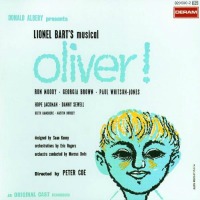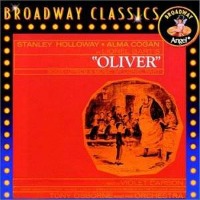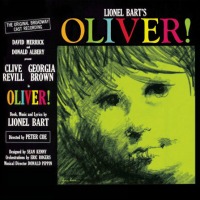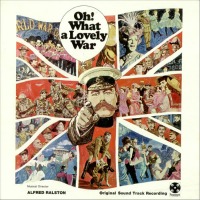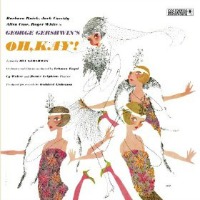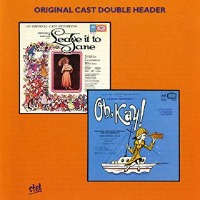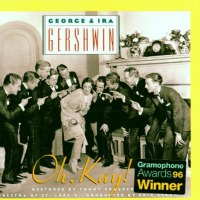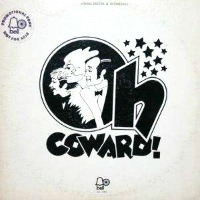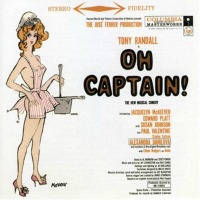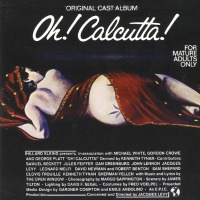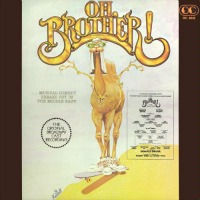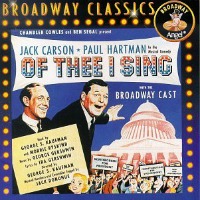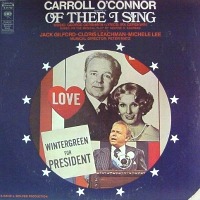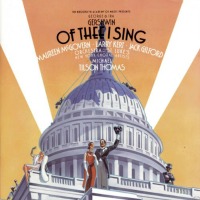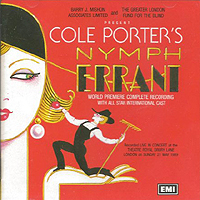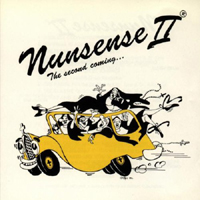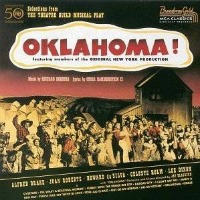 Original Broadway Cast, 1943 (Decca)
Original Broadway Cast, 1943 (Decca)  (5 / 5) This thrilling cast album of Rodgers & Hammerstein’s Oklahoma! score is the one, the only, the original that’s credited with starting it all. The show was a groundbreaking triumph in its day, and Decca pulled out all the stops to preserve its musical component; this was the first time a full score was recorded commercially by the entire original cast with the original orchestrations as heard in the theater. The album glories in such now-classic R&H songs as “Oh, What a Beautiful Mornin’,” “The Surrey With the Fringe on Top,” “Kansas City,” “People Will Say We’re in Love,” “Out of My Dreams,” and the exhilarating title tune, all delivered with enormous spirit and enthusiasm. In particular, the joyous performances of Alfred Drake as Curly and Celeste Holm as Ado Annie show us why these two stars launched major careers with this show. That said, there’s an antique quality to aspects of the recording that may be jarring; the performers’ enunciation is exaggerated as if for stage delivery, rather than being modified for the studio sessions, and the limitations of the era’s technology also make the orchestrations sound a bit squeaky. Still, this is not only the first recording of a great American musical but also, for all intents and purposes, the original original cast album. As such, it’s a must for any serious collector. Note: The two most recent editions of this classic offer all of the songs from both Volumes I and II of the recording as released back in the 1940s, including “The Farmer and the Cowman,” “Lonely Room” (sung by Alfred Drake, not by Howard Da Silva, who originated the role of Jud), and a few other tracks from Volume II. Sadly missing, because it was not recorded at the time, is the music that accompanied the groundbreaking dream ballet “Laurey Makes Up Her Mind” as created and choreographed by the great Agnes de Mille. — Gerard Alessandrini
(5 / 5) This thrilling cast album of Rodgers & Hammerstein’s Oklahoma! score is the one, the only, the original that’s credited with starting it all. The show was a groundbreaking triumph in its day, and Decca pulled out all the stops to preserve its musical component; this was the first time a full score was recorded commercially by the entire original cast with the original orchestrations as heard in the theater. The album glories in such now-classic R&H songs as “Oh, What a Beautiful Mornin’,” “The Surrey With the Fringe on Top,” “Kansas City,” “People Will Say We’re in Love,” “Out of My Dreams,” and the exhilarating title tune, all delivered with enormous spirit and enthusiasm. In particular, the joyous performances of Alfred Drake as Curly and Celeste Holm as Ado Annie show us why these two stars launched major careers with this show. That said, there’s an antique quality to aspects of the recording that may be jarring; the performers’ enunciation is exaggerated as if for stage delivery, rather than being modified for the studio sessions, and the limitations of the era’s technology also make the orchestrations sound a bit squeaky. Still, this is not only the first recording of a great American musical but also, for all intents and purposes, the original original cast album. As such, it’s a must for any serious collector. Note: The two most recent editions of this classic offer all of the songs from both Volumes I and II of the recording as released back in the 1940s, including “The Farmer and the Cowman,” “Lonely Room” (sung by Alfred Drake, not by Howard Da Silva, who originated the role of Jud), and a few other tracks from Volume II. Sadly missing, because it was not recorded at the time, is the music that accompanied the groundbreaking dream ballet “Laurey Makes Up Her Mind” as created and choreographed by the great Agnes de Mille. — Gerard Alessandrini
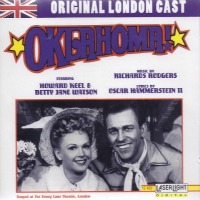 Original London Cast, 1947 (HMV/various CD labels)
Original London Cast, 1947 (HMV/various CD labels)  (2 / 5) The original London production of Oklahoma! was recorded in severely edited fashion, with the songs laid down as medleys on 78-rpm platters — four medleys of 12 songs. Curly is sung by Howard Keel (or, as he was billed at the time, Harold Keel), whose strong voice is immediately identifiable. Betty Jane Watson as Laurey sings very nicely until the last note of “People Will Say We’re in Love,” when she hits a high Q-sharp above P. The result is the screechiest soprano sound since Janet Leigh screamed bloody murder in Psycho. Because so much of the score is omitted, this album is worth hearing mainly to enjoy the baritone of the young Keel as recorded a few years before he became a star of M-G-M movie musicals. — G.A.
(2 / 5) The original London production of Oklahoma! was recorded in severely edited fashion, with the songs laid down as medleys on 78-rpm platters — four medleys of 12 songs. Curly is sung by Howard Keel (or, as he was billed at the time, Harold Keel), whose strong voice is immediately identifiable. Betty Jane Watson as Laurey sings very nicely until the last note of “People Will Say We’re in Love,” when she hits a high Q-sharp above P. The result is the screechiest soprano sound since Janet Leigh screamed bloody murder in Psycho. Because so much of the score is omitted, this album is worth hearing mainly to enjoy the baritone of the young Keel as recorded a few years before he became a star of M-G-M movie musicals. — G.A.
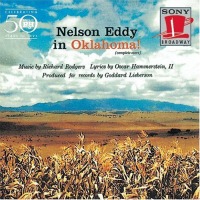 Studio Cast, 1952 (Columbia/Sony)
Studio Cast, 1952 (Columbia/Sony)  (3 / 5) Produced by Goddard Lieberson, this fine recording is conducted by Broadway maestro Lehman Engel. Hollywood singing star Nelson Eddy is Curly; his strong, beautiful voice is a natural for this romantic baritone role, but he may sound a bit too operatic and stodgy for some listeners. Kaye Ballard’s Ado Annie is a classic turn, her belt voice and comic genius making for one of the best recordings of “I Cain’t Say No.” Virginia Haskins is a lovely Laurey, the great Portia Nelson is on hand as Aunt Eller, and Wilton Clary rounds out the cast as Will Parker. With its high-fidelity sound, this album gives us a better sense of Robert Russell Bennett’s orchestrations than does the 1943 recording. While it’s far from the best aural document of Oklahoma! in sum, there is much to recommend it. — G.A.
(3 / 5) Produced by Goddard Lieberson, this fine recording is conducted by Broadway maestro Lehman Engel. Hollywood singing star Nelson Eddy is Curly; his strong, beautiful voice is a natural for this romantic baritone role, but he may sound a bit too operatic and stodgy for some listeners. Kaye Ballard’s Ado Annie is a classic turn, her belt voice and comic genius making for one of the best recordings of “I Cain’t Say No.” Virginia Haskins is a lovely Laurey, the great Portia Nelson is on hand as Aunt Eller, and Wilton Clary rounds out the cast as Will Parker. With its high-fidelity sound, this album gives us a better sense of Robert Russell Bennett’s orchestrations than does the 1943 recording. While it’s far from the best aural document of Oklahoma! in sum, there is much to recommend it. — G.A.
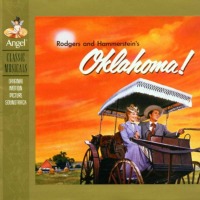 Film Soundtrack, 1955 (Capitol/Angel)
Film Soundtrack, 1955 (Capitol/Angel)  (5 / 5) Although the original Broadway cast album of Oklahoma! is a treasure, the film soundtrack recording is even more satisfying overall. Beautifully recorded in stereo, the score is even closer to complete here, and the performances remain unsurpassed. The singing of Gordon MacRae and Shirley Jones is magnificent; with their melodic voices and naturalistic diction, they offer perfect examples of how to deliver musical theater material. MacRae’s renditions of “Oh, What a Beautiful Mornin'” and “The Surrey With the Fringe on Top” are superb, while Jones’s singing in “People Will Say We’re in Love” and “Out of My Dreams” is breathtaking. Neither of their performances, nor those of Gloria Grahame as Ado Annie, Gene Nelson as Will Parker, and the rest of the cast, sound the least bit dated. The grand orchestrations are expanded from the Broadway originals and a bit Hollywoodized, but never overblown. Angel’s expanded CD contains two overtures and all of the film’s (and show’s) wonderful dance music, including the dream ballet. — G.A.
(5 / 5) Although the original Broadway cast album of Oklahoma! is a treasure, the film soundtrack recording is even more satisfying overall. Beautifully recorded in stereo, the score is even closer to complete here, and the performances remain unsurpassed. The singing of Gordon MacRae and Shirley Jones is magnificent; with their melodic voices and naturalistic diction, they offer perfect examples of how to deliver musical theater material. MacRae’s renditions of “Oh, What a Beautiful Mornin'” and “The Surrey With the Fringe on Top” are superb, while Jones’s singing in “People Will Say We’re in Love” and “Out of My Dreams” is breathtaking. Neither of their performances, nor those of Gloria Grahame as Ado Annie, Gene Nelson as Will Parker, and the rest of the cast, sound the least bit dated. The grand orchestrations are expanded from the Broadway originals and a bit Hollywoodized, but never overblown. Angel’s expanded CD contains two overtures and all of the film’s (and show’s) wonderful dance music, including the dream ballet. — G.A.
 Studio Cast, 1964 (Columbia/Masterworks Broadway)
Studio Cast, 1964 (Columbia/Masterworks Broadway)  (1 / 5) John Raitt did not create the role of Curly in Oklahoma! but he played it on tour. (Rodgers and Hammerstein liked Raitt so much that they cast him as Billy Bigelow in their next show, Carousel.) When Columbia decided in the mid 1960s to make a stereo studio recording of Oklahoma! starring Raitt, it sounded like a brilliant idea. Unfortunately, a “fresh approach” to the score was taken, and the results are fairly disastrous. Philip J. Lang created new, punched-up orchestrations that have a 1960s camp edge and are nowhere near as thrilling as the originals. Florence Henderson, who had played Laurey as a replacement on Broadway, is only adequate here; she might have come across better if the recording had been more faithful to the Broadway score. Phyllis Newman makes a fine, funny Ado Annie, but, again, her work is sabotaged by the arrangements and orchestrations. Some of the supporting performances are so twangy and Hillbilly-sounding that they’re hard to listen to. “Oh! What a Beautiful Mornin'” is the only commendable track on the album, because the orchestrations for this song are less phony sounding than the rest, allowing Raitt’s lovely interpretation to shine through. Still, on the whole, the recording sounds nothing like a theatrical performance and is a huge disappointment. — G.A.
(1 / 5) John Raitt did not create the role of Curly in Oklahoma! but he played it on tour. (Rodgers and Hammerstein liked Raitt so much that they cast him as Billy Bigelow in their next show, Carousel.) When Columbia decided in the mid 1960s to make a stereo studio recording of Oklahoma! starring Raitt, it sounded like a brilliant idea. Unfortunately, a “fresh approach” to the score was taken, and the results are fairly disastrous. Philip J. Lang created new, punched-up orchestrations that have a 1960s camp edge and are nowhere near as thrilling as the originals. Florence Henderson, who had played Laurey as a replacement on Broadway, is only adequate here; she might have come across better if the recording had been more faithful to the Broadway score. Phyllis Newman makes a fine, funny Ado Annie, but, again, her work is sabotaged by the arrangements and orchestrations. Some of the supporting performances are so twangy and Hillbilly-sounding that they’re hard to listen to. “Oh! What a Beautiful Mornin'” is the only commendable track on the album, because the orchestrations for this song are less phony sounding than the rest, allowing Raitt’s lovely interpretation to shine through. Still, on the whole, the recording sounds nothing like a theatrical performance and is a huge disappointment. — G.A.
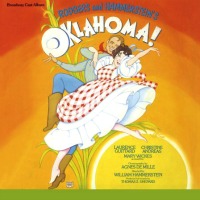 Broadway Cast, 1979 (RCA)
Broadway Cast, 1979 (RCA)  (3 / 5) Here’s a spirited performance led by Jay Blackton, conductor of the original Broadway production of Oklahoma! as well as the soundtrack score of the film version. The 1979 Broadway revival of the show that yielded this cast album was a hit, and the sound quality of the recording is excellent. Christine Andreas is full of warmth and pluck as Laurey, Mary Wickes is perfect as Aunt Eller, and Christine Ebersole is terrific as Ado Annie. The disappointment is that Laurence Guittard, although a fine singer, seems miscast as Curly. In fact, Martin Vidnovic as Jud sounds so much sexier than Guittard that you almost wish Laurey would leave Curly and run off with him! — G.A.
(3 / 5) Here’s a spirited performance led by Jay Blackton, conductor of the original Broadway production of Oklahoma! as well as the soundtrack score of the film version. The 1979 Broadway revival of the show that yielded this cast album was a hit, and the sound quality of the recording is excellent. Christine Andreas is full of warmth and pluck as Laurey, Mary Wickes is perfect as Aunt Eller, and Christine Ebersole is terrific as Ado Annie. The disappointment is that Laurence Guittard, although a fine singer, seems miscast as Curly. In fact, Martin Vidnovic as Jud sounds so much sexier than Guittard that you almost wish Laurey would leave Curly and run off with him! — G.A.
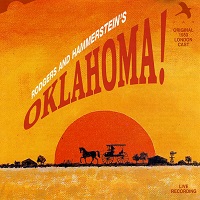 London Cast, 1980 (JAY)
London Cast, 1980 (JAY)  (2 / 5) Recorded live in performance with an audience — a rarity in the cast album sphere — this recording gains a certain excitement for that reason, undercut by the fact that most of the leading and featured vocal performances are unsatisfying in one respect or another. The best voice to be heard here is the rich, gorgeous baritone of male lead John Diedrich as Curly, but Diedrich’s quasi-operatic style of singing seems too affected for the role of this salt-of-the-earth cowpoke. In contrast, Rosamund Shelley as Laurey, Mark White as Will Parker, and Alfred Molina as Jud Fry all have voices that are not fully up to their assignments. For instance, Shelley sounds fine in “Many a New Day” until the end of the song, where she doesn’t; and Molina, who has since had a highly successful career on stage and screen, surprisingly fails to compensate in the acting department for his barely adequate singing of “Lonely Room.” On the plus side, Jillian Mack is a delightful, funny, charming Ado Annie with a good voice. The orchestrations sound as if they’re modeled on Robert Russell Bennett’s originals with a fair amount of unnecessary futzing, and the newly arranged overture is not an improvement, but the chorus sounds terrific in the title song and elsewhere. John Owen Edwards conducts the entire performance with skill and vigor. — Michael Portantiere
(2 / 5) Recorded live in performance with an audience — a rarity in the cast album sphere — this recording gains a certain excitement for that reason, undercut by the fact that most of the leading and featured vocal performances are unsatisfying in one respect or another. The best voice to be heard here is the rich, gorgeous baritone of male lead John Diedrich as Curly, but Diedrich’s quasi-operatic style of singing seems too affected for the role of this salt-of-the-earth cowpoke. In contrast, Rosamund Shelley as Laurey, Mark White as Will Parker, and Alfred Molina as Jud Fry all have voices that are not fully up to their assignments. For instance, Shelley sounds fine in “Many a New Day” until the end of the song, where she doesn’t; and Molina, who has since had a highly successful career on stage and screen, surprisingly fails to compensate in the acting department for his barely adequate singing of “Lonely Room.” On the plus side, Jillian Mack is a delightful, funny, charming Ado Annie with a good voice. The orchestrations sound as if they’re modeled on Robert Russell Bennett’s originals with a fair amount of unnecessary futzing, and the newly arranged overture is not an improvement, but the chorus sounds terrific in the title song and elsewhere. John Owen Edwards conducts the entire performance with skill and vigor. — Michael Portantiere
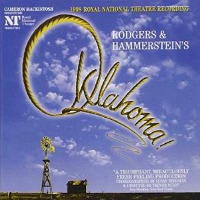 London Cast, 1998 (First Night)
London Cast, 1998 (First Night)  (4 / 5) Director Trevor Nunn’s acclaimed reinterpretation of this great American musical for London’s National Theatre brought forth elements of the Lynn Riggs play Green Grow the Lilacs, upon which Oklahoma! is based. Hugh Jackman may not sing with the beauty of Gordon MacRae, but he brings plenty of gusto and sex appeal to the role of Curly. Josefina Gabrielle was billed as the first woman ever to act, sing, and dance the part of Laurey, rather than yielding to a counterpart in the dream ballet. Of those three talents, her singing is the least impressive, but her delivery of Laurey’s songs doesn’t seriously compromise the recording. Maureen Lipman as Aunt Eller and Shuler Hensley as Jud Fry are both outstanding, the latter giving an emotionally complex, spine-tingling performance of “Lonely Room” that surpasses all other versions. The original orchestrations were revamped by William David Brohn to great effect, and David Krane created new dance music for the show’s stunning new choreography by Susan Stroman. — G.A.
(4 / 5) Director Trevor Nunn’s acclaimed reinterpretation of this great American musical for London’s National Theatre brought forth elements of the Lynn Riggs play Green Grow the Lilacs, upon which Oklahoma! is based. Hugh Jackman may not sing with the beauty of Gordon MacRae, but he brings plenty of gusto and sex appeal to the role of Curly. Josefina Gabrielle was billed as the first woman ever to act, sing, and dance the part of Laurey, rather than yielding to a counterpart in the dream ballet. Of those three talents, her singing is the least impressive, but her delivery of Laurey’s songs doesn’t seriously compromise the recording. Maureen Lipman as Aunt Eller and Shuler Hensley as Jud Fry are both outstanding, the latter giving an emotionally complex, spine-tingling performance of “Lonely Room” that surpasses all other versions. The original orchestrations were revamped by William David Brohn to great effect, and David Krane created new dance music for the show’s stunning new choreography by Susan Stroman. — G.A.
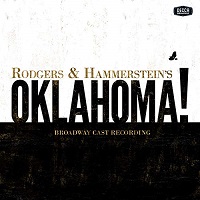 Broadway Cast, 2019 (Verve-Decca Broadway)
Broadway Cast, 2019 (Verve-Decca Broadway)  (1 / 5) Daniel Fish directed this radically reinterpreted production of Oklahoma! and, in so doing, largely contradicted the tone, spirit, and worldview set forth by the show’s creators. Yet the disrespectful elements of this revisal were mostly limited to the staging, the choreography, and the direction of the actors — for example, the implication of a homoerotic attraction between Curly and Jud, the addition of a sex act (not seen, but clearly heard in darkness ) between Jud and Laurey, the ridiculous re-conception of the dream ballet, and the murder of Jud by Curly in cold blood. Meanwhile, the adaptation and performance of the score were quite well done and pleasing overall, with the major exception of the dream ballet (see below). For the most part, Daniel Kluger skillfully re-orchestrated the classic R&H songs for a country-style band and, with some help from Nathan Koci, effectively rearranged the choruses for a singing ensemble much smaller than what would be heard in a traditional presentation of this score. Two of the lead singers are standouts: Damon Daunno is a warm, sexy, pleasantly yodeling Curly, and Ali Stroker a high-spirited, country-belting Ado Annie. Also very listenable are James Davis’s appealing Will Parker and Patrick Vail’s damaged yet empathetic Jud. But Rebecca Naomi Jones is unpleasant to hear in most of Laurey’s music, especially when required to sing way above her natural alto range due to someone’s strange decision not to lower the keys of certain songs far enough for her comfort; and even where the keys have been transposed to fit Jones’s range, she still dissatisfies because her vocal timbre is so ill-suited to the role. Her performance and the destructive, wholesale rearrangement of the music for the dream ballet (here dominated by “fuzz guitar”) drag this recording down from the higher estimation it would otherwise have received. — M.P.
(1 / 5) Daniel Fish directed this radically reinterpreted production of Oklahoma! and, in so doing, largely contradicted the tone, spirit, and worldview set forth by the show’s creators. Yet the disrespectful elements of this revisal were mostly limited to the staging, the choreography, and the direction of the actors — for example, the implication of a homoerotic attraction between Curly and Jud, the addition of a sex act (not seen, but clearly heard in darkness ) between Jud and Laurey, the ridiculous re-conception of the dream ballet, and the murder of Jud by Curly in cold blood. Meanwhile, the adaptation and performance of the score were quite well done and pleasing overall, with the major exception of the dream ballet (see below). For the most part, Daniel Kluger skillfully re-orchestrated the classic R&H songs for a country-style band and, with some help from Nathan Koci, effectively rearranged the choruses for a singing ensemble much smaller than what would be heard in a traditional presentation of this score. Two of the lead singers are standouts: Damon Daunno is a warm, sexy, pleasantly yodeling Curly, and Ali Stroker a high-spirited, country-belting Ado Annie. Also very listenable are James Davis’s appealing Will Parker and Patrick Vail’s damaged yet empathetic Jud. But Rebecca Naomi Jones is unpleasant to hear in most of Laurey’s music, especially when required to sing way above her natural alto range due to someone’s strange decision not to lower the keys of certain songs far enough for her comfort; and even where the keys have been transposed to fit Jones’s range, she still dissatisfies because her vocal timbre is so ill-suited to the role. Her performance and the destructive, wholesale rearrangement of the music for the dream ballet (here dominated by “fuzz guitar”) drag this recording down from the higher estimation it would otherwise have received. — M.P.
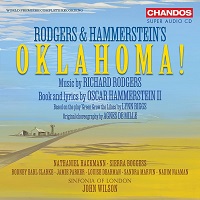 Studio Cast, 2023 (Chandos, 2CDs)
Studio Cast, 2023 (Chandos, 2CDs)  (5 / 5) Almost as if to serve as a counterweight — some might say an antidote — to the 2019 Broadway cast album of Oklahoma! reviewed above (and the tremendously off-putting production that yielded it), this beautiful recording appeared in 2023. Chief among its virtues is the fact that it offers a note-complete presentation of the classic Rodgers & Hammerstein score. For example, both of the show’s extended dance music sequences, “Many a New Day” and the dream ballet “Laurey Makes Up Her Mind,” are heard here in full and in their original orchestrations for the first time on an audio recording. John Wilson does a superb job of leading the Sinfonia of London, conducting with obvious love and respect for the score, and all of the tempi he sets seem exactly right. The singers are also first-rate and perfectly cast, from the golden-voiced Nathaniel Hackmann and Sierra Boggess as Curly and Laurey to the comically charming Jamie Parker and Louise Dearman as Will Parker and Ado Annie. Rodney Earle Clarke gives a moving rendition of Jud Fry’s tortured confessional “Lonely Room”; brief but entertaining character portraits are offered by Sandra Marvin as Aunt Eller, Nadim Naaman as Ali Hakin, and Leo Roberts as Andrew Carnes; and the chorus and orchestra perform to the highest standards. So, what’s not to love about this album? Nothing whatsoever. — M.P.
(5 / 5) Almost as if to serve as a counterweight — some might say an antidote — to the 2019 Broadway cast album of Oklahoma! reviewed above (and the tremendously off-putting production that yielded it), this beautiful recording appeared in 2023. Chief among its virtues is the fact that it offers a note-complete presentation of the classic Rodgers & Hammerstein score. For example, both of the show’s extended dance music sequences, “Many a New Day” and the dream ballet “Laurey Makes Up Her Mind,” are heard here in full and in their original orchestrations for the first time on an audio recording. John Wilson does a superb job of leading the Sinfonia of London, conducting with obvious love and respect for the score, and all of the tempi he sets seem exactly right. The singers are also first-rate and perfectly cast, from the golden-voiced Nathaniel Hackmann and Sierra Boggess as Curly and Laurey to the comically charming Jamie Parker and Louise Dearman as Will Parker and Ado Annie. Rodney Earle Clarke gives a moving rendition of Jud Fry’s tortured confessional “Lonely Room”; brief but entertaining character portraits are offered by Sandra Marvin as Aunt Eller, Nadim Naaman as Ali Hakin, and Leo Roberts as Andrew Carnes; and the chorus and orchestra perform to the highest standards. So, what’s not to love about this album? Nothing whatsoever. — M.P.
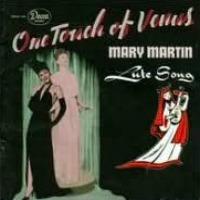 Original Broadway Cast, 1943 (Decca)
Original Broadway Cast, 1943 (Decca)  (3 / 5) This incomplete recording of composer Kurt Weill’s One Touch of Venus paints a very deceptive picture of the score. While there are 17 songs in the score, only 10 are to be found here, sung by only two members of the original cast: Mary Martin and Kenny Baker. All of Martin’s material is included, but the songs that were sung in the show by Paula Laurence and John Boles are not. (Actually, Baker inherits one of Boles’ numbers, “Westwind.”) Since the show is, for the most part, a low comedy, the fact that seven of the comic songs are missing from the album means that this Venus misses by more than a touch. But Martin is charming, particularly in the score’s two best songs, ”I’m a Stranger Here Myself’ and “That’s Him,” and Baker’s tenor will appeal to many listeners. The show’s lyrics, by the talented light-versifier Ogden Nash, are witty and filled with amusing wordplay, even if not well integrated with the book by Nash and S.J. Perelman. The music for the two Agnes de Mille ballets, “Forty Minutes for Lunch” and the climactic “Venus in Ozone Heights,” is impressive; even edited as they are here, these pieces are quite stunning. Six songs from Martin’s next show, Lute Song, are heard as bonus tracks on Decca’s CD. — David Wolf
(3 / 5) This incomplete recording of composer Kurt Weill’s One Touch of Venus paints a very deceptive picture of the score. While there are 17 songs in the score, only 10 are to be found here, sung by only two members of the original cast: Mary Martin and Kenny Baker. All of Martin’s material is included, but the songs that were sung in the show by Paula Laurence and John Boles are not. (Actually, Baker inherits one of Boles’ numbers, “Westwind.”) Since the show is, for the most part, a low comedy, the fact that seven of the comic songs are missing from the album means that this Venus misses by more than a touch. But Martin is charming, particularly in the score’s two best songs, ”I’m a Stranger Here Myself’ and “That’s Him,” and Baker’s tenor will appeal to many listeners. The show’s lyrics, by the talented light-versifier Ogden Nash, are witty and filled with amusing wordplay, even if not well integrated with the book by Nash and S.J. Perelman. The music for the two Agnes de Mille ballets, “Forty Minutes for Lunch” and the climactic “Venus in Ozone Heights,” is impressive; even edited as they are here, these pieces are quite stunning. Six songs from Martin’s next show, Lute Song, are heard as bonus tracks on Decca’s CD. — David Wolf Studio Cast, 2014 (JAY)
Studio Cast, 2014 (JAY)  (4 / 5) It took John Yap years to release his complete studio cast recording of One Touch of Venus, but was it ever worth the wait! Lovers of the score will thrill not just to the full song stack, including incidental tunes (this could serve as a reference recording) but also three numbers cut prior to Broadway. Weill’s own orchestrations find their jazzy, snazzy shape thanks to the superb playing of the National Symphony Orchestra under the baton of John Owen Edwards and James Holmes. Maybe not every number is a classic (“Catch Hatch?”), but when you can enjoy Weill’s scintillating dance arrangements of the five ballets, which range in style and content from the comedic to the sensual to the tragic, who cares? Melissa Errico, repeating her 1996 Encores! triumph in the title role, is a major draw; her luscious, shimmering soprano lends an eternal longing and an erotic edge to classic numbers like “I’m a Stranger Here Myself,” “Lonely Heart,” “Speak Low,” and “That’s Him.” But almost everyone here is first-rate, including Brent Barrett as Venus’s milquetoast love interest, Judy Kaye and Lauren Worsham as his constantly sniping would-be in-laws, and Ron Raines as the bitter, art-collecting antagonist, Whitelaw Savory. (Broadway favorite Karen Ziemba even makes a wacky, if extremely brief, spoken cameo appearance.) The only major misstep: Victoria Clark sounds far too prissy, patrician, and out of sorts in the down-and-dirty role of Savory’s wise-cracking sidekick, Molly. But one flawed facet is forgivable, considering that the rest of the recording is a sparkling gem. — Matthew Muray
(4 / 5) It took John Yap years to release his complete studio cast recording of One Touch of Venus, but was it ever worth the wait! Lovers of the score will thrill not just to the full song stack, including incidental tunes (this could serve as a reference recording) but also three numbers cut prior to Broadway. Weill’s own orchestrations find their jazzy, snazzy shape thanks to the superb playing of the National Symphony Orchestra under the baton of John Owen Edwards and James Holmes. Maybe not every number is a classic (“Catch Hatch?”), but when you can enjoy Weill’s scintillating dance arrangements of the five ballets, which range in style and content from the comedic to the sensual to the tragic, who cares? Melissa Errico, repeating her 1996 Encores! triumph in the title role, is a major draw; her luscious, shimmering soprano lends an eternal longing and an erotic edge to classic numbers like “I’m a Stranger Here Myself,” “Lonely Heart,” “Speak Low,” and “That’s Him.” But almost everyone here is first-rate, including Brent Barrett as Venus’s milquetoast love interest, Judy Kaye and Lauren Worsham as his constantly sniping would-be in-laws, and Ron Raines as the bitter, art-collecting antagonist, Whitelaw Savory. (Broadway favorite Karen Ziemba even makes a wacky, if extremely brief, spoken cameo appearance.) The only major misstep: Victoria Clark sounds far too prissy, patrician, and out of sorts in the down-and-dirty role of Savory’s wise-cracking sidekick, Molly. But one flawed facet is forgivable, considering that the rest of the recording is a sparkling gem. — Matthew Muray

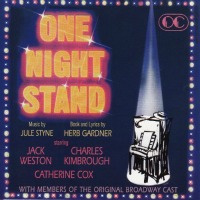
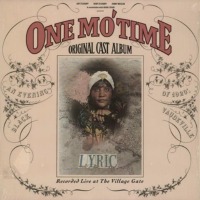
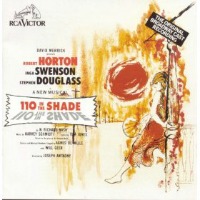
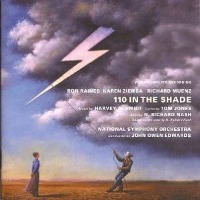

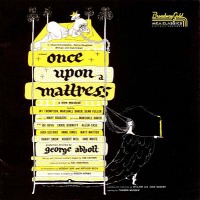
 (5 / 5) The fairy tale source material is “The Princess and the Pea,” given a satirical fleshing-out. But Once Upon a Mattress was really a Cinderella show. Its composer was theatrical royalty: Mary Rodgers, daughter of Richard. Its lyricist, Marshall Barer, was unknown, and so was most of the cast. A big-league production team, led by director George Abbott, launched the show downtown, and it soon moved up to Broadway. The score is charming and funny by turns, but the show’s success hinged largely on its star. As Winnifred the Woebegone, Carol Burnett established herself as a strong singer and a peerless comic, and the proof is here on the recording. Burnett is fabulous as she caterwauls over “The Swamps of Home” or torches about wanting to be one of the lucky princesses who end up living “Happily Ever After.” The supporting cast is ideal: Joe Bova is an appealing Prince Dauntless; Jane White is the imperious Queen Aggravain; and Matt Mattox as the Jester does a fine job with one of the score’s best numbers, “Very Soft Shoes.” Apart from the necessary absence of Jack Gilford’s priceless mime performance as the mute king, there’s nothing at all amiss in this recording. Brava Burnett! — Richard Barrios
(5 / 5) The fairy tale source material is “The Princess and the Pea,” given a satirical fleshing-out. But Once Upon a Mattress was really a Cinderella show. Its composer was theatrical royalty: Mary Rodgers, daughter of Richard. Its lyricist, Marshall Barer, was unknown, and so was most of the cast. A big-league production team, led by director George Abbott, launched the show downtown, and it soon moved up to Broadway. The score is charming and funny by turns, but the show’s success hinged largely on its star. As Winnifred the Woebegone, Carol Burnett established herself as a strong singer and a peerless comic, and the proof is here on the recording. Burnett is fabulous as she caterwauls over “The Swamps of Home” or torches about wanting to be one of the lucky princesses who end up living “Happily Ever After.” The supporting cast is ideal: Joe Bova is an appealing Prince Dauntless; Jane White is the imperious Queen Aggravain; and Matt Mattox as the Jester does a fine job with one of the score’s best numbers, “Very Soft Shoes.” Apart from the necessary absence of Jack Gilford’s priceless mime performance as the mute king, there’s nothing at all amiss in this recording. Brava Burnett! — Richard Barrios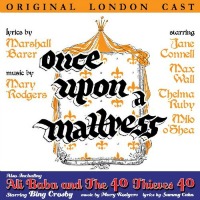
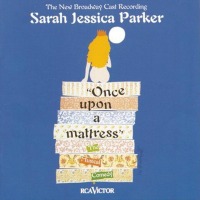
 (1 / 5) After nearly four decades and two televised productions (both starring Carol Burnett), Mattress made it back to Broadway, albeit with drab results. Some of the show’s charm was still evident, but more conspicuous was the by-the-numbers aura that permeates the cast recording. Alas, Sarah Jessica Parker was not an apt choice for the heroine; although her musical theater experience dates back to Annie, and her Winnifred was Tony-nominated, she just doesn’t cut it. Setting aside the untouchable Burnett template, Parker can only manage to serve up makeshift vocalism and indifferent comic timing. The remainder of the cast, the chorus, and the orchestra perform in acceptable “Broadway generic” fashion, although Lawrence Clayton’s vocal tone is very thin in “Many Moons Ago.” The main virtue of this album is that it’s complete — including “The Minstrel, the Jester, and I,” a song that had not been recorded for the OBC album — but whose crummy idea was it to shoehorn a disco break into “The Spanish Panic?” Stick with Burnett and company. [Ed. Note: A third television production of Mattress, with Tracey Ullman as Winnifred and Burnett as Aggravain, aired in 2004 and is available on home video, but no soundtrack recording was released.] — R.B.
(1 / 5) After nearly four decades and two televised productions (both starring Carol Burnett), Mattress made it back to Broadway, albeit with drab results. Some of the show’s charm was still evident, but more conspicuous was the by-the-numbers aura that permeates the cast recording. Alas, Sarah Jessica Parker was not an apt choice for the heroine; although her musical theater experience dates back to Annie, and her Winnifred was Tony-nominated, she just doesn’t cut it. Setting aside the untouchable Burnett template, Parker can only manage to serve up makeshift vocalism and indifferent comic timing. The remainder of the cast, the chorus, and the orchestra perform in acceptable “Broadway generic” fashion, although Lawrence Clayton’s vocal tone is very thin in “Many Moons Ago.” The main virtue of this album is that it’s complete — including “The Minstrel, the Jester, and I,” a song that had not been recorded for the OBC album — but whose crummy idea was it to shoehorn a disco break into “The Spanish Panic?” Stick with Burnett and company. [Ed. Note: A third television production of Mattress, with Tracey Ullman as Winnifred and Burnett as Aggravain, aired in 2004 and is available on home video, but no soundtrack recording was released.] — R.B.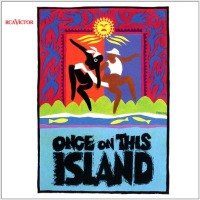
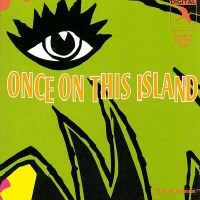

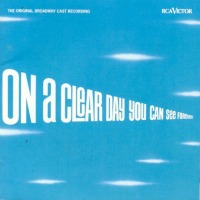

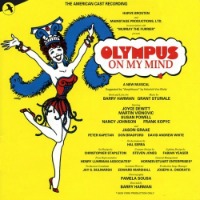
 (2 / 5) During the opening number of this musical based on Amphitryon, as the three-man chorus sings “We are the chorus / Please don’t ignore us,” a woman suddenly joins them and adds, “My name’s Delores.” Played by Joyce DeWitt, she is the wife of the show’s principal backer, Murray the Furrier, and she’s here because he has promised her a role. Sweet but untalented, this ex-showgirl pops up throughout the show to help with numbers or exposition, always while modeling Murray’s furs. The joke is funny for a while, less so as Olympus on My Mind wears on. It distracts us from the main plot: the story of Jupiter, who comes to earth to win a beautiful woman by disguising himself as her husband, Amphitryon. In this version, Jupiter isn’t satisfied with bedding her; he wants her to love him. His son, Mercury, warns him that, on Earth, he will start feeling human emotions — and, sure enough, Jupiter begins to experience real pain. But as soon as we start caring about him, Delores is back with her shtick. The main plot, involving disguises and double identities, is reminiscent of The Boys From Syracuse, and much of it is well written and quite funny. The songs, by composer Grant Sturiale and lyricist Barry Harman, are prankish and playful. Among the best of them are “The Gods on Tap,” “Back So Soon,” “Wonderful,” “A Little Something of Yourself,” and “It Was Me!” In a strong cast consisting of performers from two separate Off-Broadway productions, Martin Vidnovic sings well as Jupiter and Amphitryon, Frank Copyk is a funny Sosia, and Jason Graae is a very spruce Mercury. — David Wolf
(2 / 5) During the opening number of this musical based on Amphitryon, as the three-man chorus sings “We are the chorus / Please don’t ignore us,” a woman suddenly joins them and adds, “My name’s Delores.” Played by Joyce DeWitt, she is the wife of the show’s principal backer, Murray the Furrier, and she’s here because he has promised her a role. Sweet but untalented, this ex-showgirl pops up throughout the show to help with numbers or exposition, always while modeling Murray’s furs. The joke is funny for a while, less so as Olympus on My Mind wears on. It distracts us from the main plot: the story of Jupiter, who comes to earth to win a beautiful woman by disguising himself as her husband, Amphitryon. In this version, Jupiter isn’t satisfied with bedding her; he wants her to love him. His son, Mercury, warns him that, on Earth, he will start feeling human emotions — and, sure enough, Jupiter begins to experience real pain. But as soon as we start caring about him, Delores is back with her shtick. The main plot, involving disguises and double identities, is reminiscent of The Boys From Syracuse, and much of it is well written and quite funny. The songs, by composer Grant Sturiale and lyricist Barry Harman, are prankish and playful. Among the best of them are “The Gods on Tap,” “Back So Soon,” “Wonderful,” “A Little Something of Yourself,” and “It Was Me!” In a strong cast consisting of performers from two separate Off-Broadway productions, Martin Vidnovic sings well as Jupiter and Amphitryon, Frank Copyk is a funny Sosia, and Jason Graae is a very spruce Mercury. — David Wolf